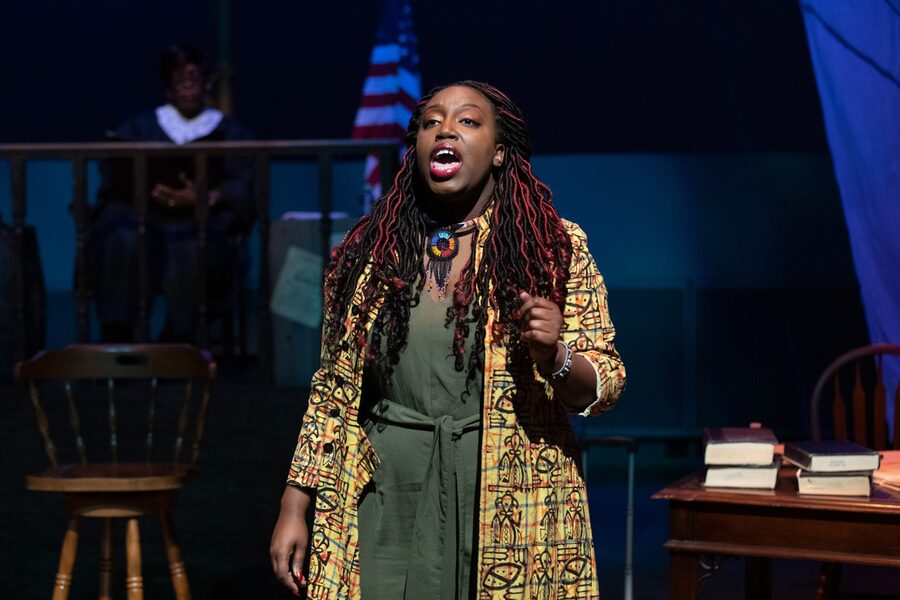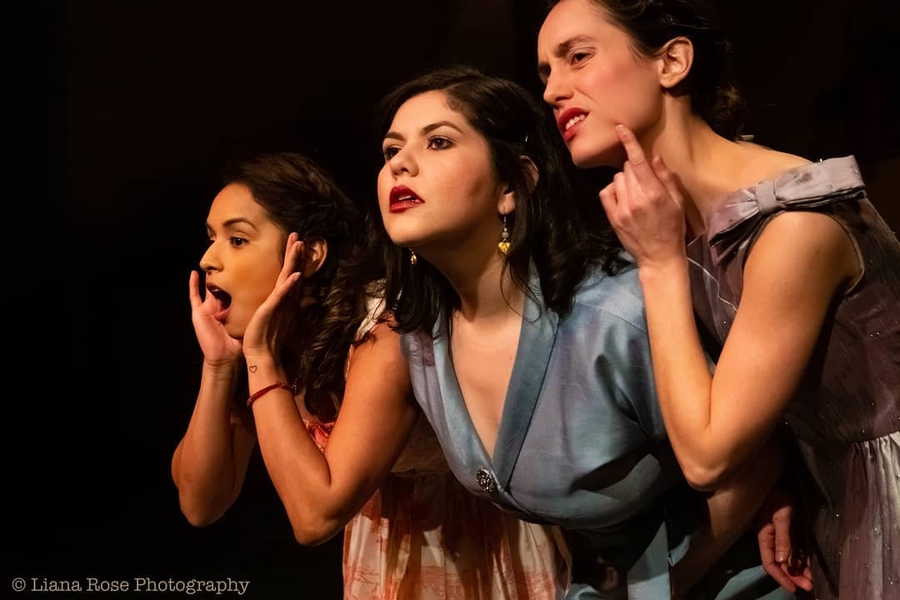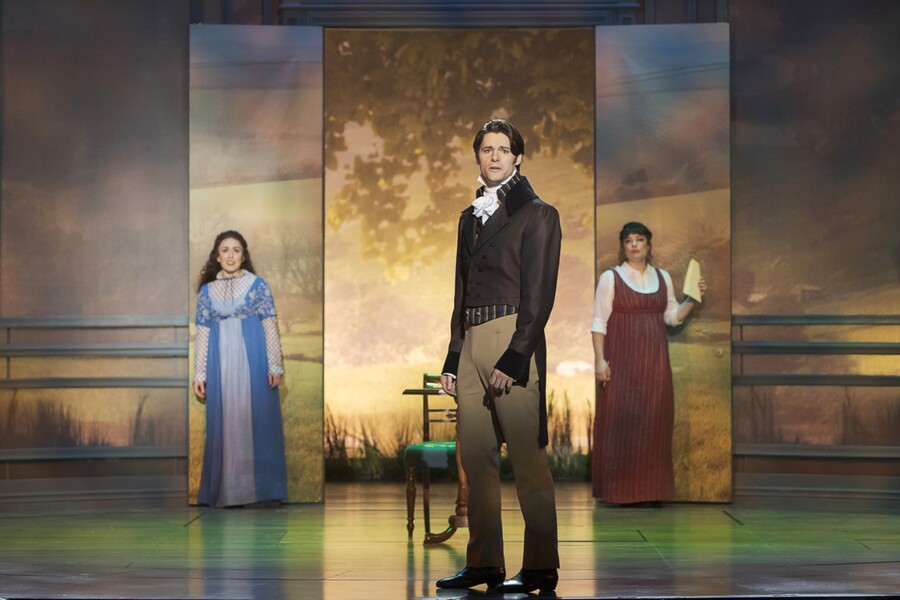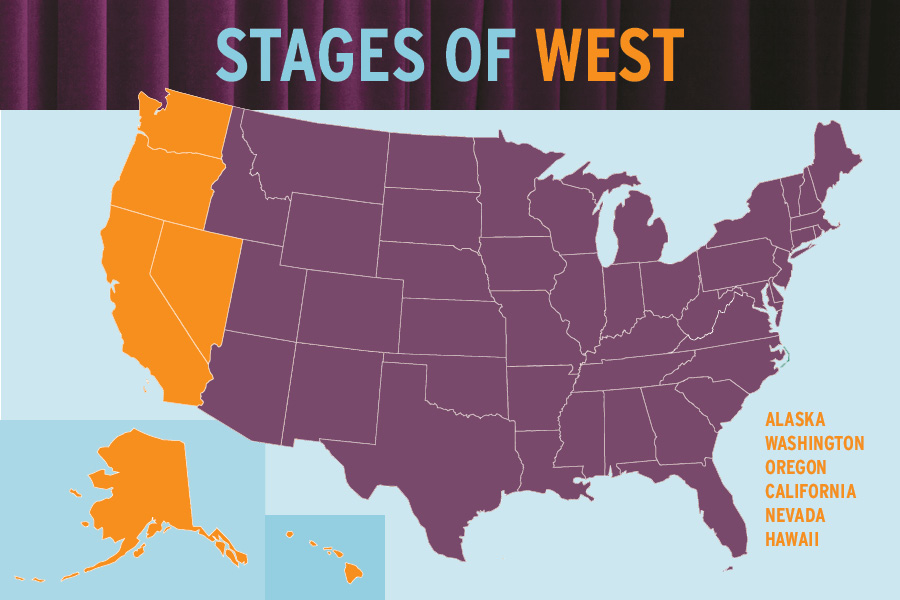The U.S. has been through a lot in just the last three months. What started as a global health pandemic has morphed into another global crisis surrounding racism and Black lives. With multiple calamities unfolding, theatres on the West Coast are slowly planning for reopening, but with a different mindset—one that focuses on the well-being of audiences as well as the inclusion of marginalized communities.

As soon as word spread about possible COVID-19 shutdowns, Sherri Young, the artistic director and founder of African American Shakespeare Company, put herself in her audience’s shoes. This was the theatre’s 25th anniversary, but for the health and safety of her community, she decided to cancel the rest of the season and postpone productions until the fall of 2021.
The company had just closed The Trial of One Short-Sighted Black Woman vs. Mammy Louise and Safreeta Mae, written by Karani Marcia Leslie Johnson, and was set to start rehearsals in two weeks for its next show. Since vacating its building on March 9, the company has slowly started rolling out online content. But with no new shows planned for more than a year, the company is mostly using this time to make adjustments and prepare for the upcoming season.
Having stayed on top of its finances during the previous season, plus some COVID-19 financial assistance, has created a safety net for the company to continue operating and paying its designers, artists, and staff. Right now, Young is looking for more artists and educators so she can move the education programs online.
The Shakespeare Company has always been about inclusion, by design. It is dedicated to elevating voices of color in theatre, giving them a safe place to unapologetically tell their stories. For Young, it’s also about wanting to see more Black stories being told by Black people in other spaces.
“I’m always an optimist,” Young said. “I am never the person thinking the glass is half empty. I always think it’s half full, and we can get more water somewhere else.” Young is hopeful that this moment will create change in all sectors of the country, including the theatre. But even as she hopes to see more diversity at predominantly white theatre companies, she said there’s still a need for “culture-specific” theatre spaces.
“They’re so important, because there’s a unique voice for that community which the other theatres won’t get,” she said.
For the Shakespeare Company, that means more than just checking off diversity boxes or receiving funding for the culture-specific plays it produces, which Young feels some white theatres are guilty of doing. Based in diversity, integrity, and pride, her company strives to build lifelong relationships with its collaborators, and to help those new to theatre build their skill sets and résumés. Young founded the Shakespeare Company to tell diverse stories to a diverse audience. And she said she’s hopeful that the field now has a chance to listen without distractions and work on solutions for a more diverse future.
“I do appreciate the time and the space we’re having right now to have these conversations,” she said. “I hope that we don’t go back to normal.”

Toward the end of March, just days before opening night for The Corrido of the San Patricios, by Beto O’Byrne, the team at Milagro was forced to pack up and go home. Since then, it launched Nueva Frontera, an online platform where artists (and not necessarily just actors) can tell their stories and share pieces of themselves with a larger audience. To take it one step further, Milagro began using the space to also highlight community issues and recently started working with other area theatre companies to expose more artists’ work.
The theatre is looking to expand its capabilities, in case it has to remain closed for some time. “We’ve been talking about building our capacities, both human and technological,” said Milagro artistic director José Gonzaléz. “We’re wanting to do more at a higher level.”
Gonzaléz has spent the last few months preparing programming, both live and virtual, for the first six months of Milagro’s next season. He recently launched Ingenio Milagro, a collaboration with theatres in surrounding states to create a space for Latino/a/x playwrights to develop their ideas alongside mentors and other artists, set to take place virtually in September. Among the theatres involved are Borderlands Theatre and Teatro Bravo, both in Arizona.
Milagro is bracing for a loss of at least $100,000 from the cancelling of shows. The team has gotten by on donations and assistance from local foundations. With Oregon moving into Phase 3 of reopening the state, the Milagro staff has begun to go back into the office, operating at just two people a day and alternating days. Still, no one is quite sure when the next season will start.
For 36 years, Milagro—the only arts organization in Portland’s Coalition of Communities of Color—has prided itself on inclusion and telling the stories of people who are often excluded or mistreated in the theatre world. The culture’s renewed focus on race in this momoent both fits Milagro’s mission and challenges it to go deeper. “We’re a culture and community that’s made up of many races,” Gonzaléz said. “We’ve done a lot of soul-searching and had conversations internally with our communities to understand the problem and see what we can do moving forward.”
Every year, Milagro puts on a festival specifically designed to showcase the work of artists in other communities. While the Latinx community needs attention on a variety of levels, Gonzaléz said, he makes it his duty to share the stage with others.
“We have a cultural environment here that speaks differently,” he said. “It speaks from the heart, speaks with importance—and we need to celebrate that.”

Since the beginning of March, Bruka Theatre in Reno, Nev., has had to minimize its presence. Out of love for its community members, it decided to close its doors on March 13, prior to stay-at-home orders. It was two weeks away from the opening of Mary Zimmerman’s Secret in the Wings when the remainder of the season was cancelled. Since then, Bruka and its sister theatres Good Luck Macbeth and Reno Little Theatre have launched the YouTube channel Ghost Light TV, which features special content like behind-the-scenes stories from actors and mini film festivals. But the leaders of these theatres have also used this time to look deep into how they operate and how they can better serve the people around them.
Bruka began shifting its mindset a little before the COVID-19 pandemic. It had just produced Lucy Kirkwood’s The Children, a story about life during apocalyptic times, and artistic director Mary Bennett began to feel the need for change. She and other directors began meeting online and examining who they were in the community, what they were doing for it, and how they could come together to do more. As the conversation around racism has grown louder throughout the country, Bennett’s personal conversations with theatre workers of color made her realize they weren’t really doing much at all.
“Even though we had Black actors come in, we weren’t really telling those stories,” Bennett said. “Now we’re trying to start the conversation of how we can change the environment of our theatres to better serve people individually and groups as a whole that are represented in our community.”
She began by inviting community members and artists they have worked with in the past to join their online meetings. The goal was to listen and learn without making them feel like they had to give answers. Then they came up with actionable steps: greater diversity in their staffs as well as their leadership boards, along with restructuring future seasons to include stories from marginalized communities, told and directed by members of those communities.
The future is still somewhat unknown for Bruka. State grants have been cut, and Bennett isn’t sure when the theatre will be back in its building, an empty space it has been paying for since March. But one thing is for sure: Change is coming to Bruka, no matter when the doors reopen.
“This pause has been scary for us,” Bennett said, “but at the same time revelatory in terms of who we are as a theatre, why we’re doing theatre, who we’re doing it for.”

The pandemic has been spent in a multitude of ways by so many different people. For Seattle’s Fifth Avenue Theatre, the time has been spent reflecting and questioning how to exist in theatre post-COVID. With each day that went by, the 5th realized more and more that they wouldn’t be returning to theatre as they once knew it.
“We’re all sort of now in a different headspace,” said producing artistic director Bill Berry. “We’re saying, okay, let’s question what was a part of our industry in the past that maybe doesn’t need to exist going into the future. What can we leave behind that doesn’t need to come with us as we come back to producing and creating?”
Berry’s mission has been figuring out how to make theatre better, and finding ways to bring the lessons learned during this time indoors back to the theatre space. His goal, he said, is to change the very way theatre is done, to make it a more sustainable practice that can accommodate more people from different backgrounds.
“We assume all these things that have been a part of our industry,” said Berry. “My team is really interested in questioning that right now and saying, ‘Let’s explore what it looks like to do it in a different way that creates more work-life balance and bring some of what we like about our homebound life with us.’ ”
The pandemic closed the 5th’s doors three days before their first preview of Sister Act. Though they haven’t taken any full productions online, they have launched Fridays @ The 5th, a recurring workshop and talkback series that takes place every Friday. Their education and engagement programs have also gone remote. They just wrapped the “Rising Star Project,” a musical collaboration project created and produced by a group of 45 teenagers over the last eight months.
Closing their doors has caused some financial strain for the 5th, of course. They’ve had to reduce everyone on the team’s salary and hours, moving everyone from full-time to part-time.
Berry is also assessing how well or poorly the 5th has included Black and brown people in their programming. He knows that he and his team are behind on this issue, but he said they are actively working to listen to their community, listen to the conversations going on, and act accordingly. The most important step Berry said they are taking is working to be anti-racist. You can be inclusive, he noted, and yet still have a racist environment and culture. His goal is to examine and dismantle that.
“The thing we’ve realized recently is that we have to stop talking about how we’re going to get back to where we were,” said Berry. “We have to think of it as a start-up, reframing what we do to what do we want to be. This is an opportunity to grow and evolve and become better. It’s not a disaster. It’s change. What’s possible is creating a new way of being.”
Gracyn Doctor is a Goldring Arts Journalism graduate student at Syracuse University.
Creative credits for production photos: The Trial of One Short-Sighted Black Woman vs. Mammy Louise and Safreeta Mae, written by Karani Marcia Leslie Johnson, directed by Sherri Young, with lighting and video design by Kevin Myrick, sound design by Barry Despenza, costume design by Corrida Carr; En el Tiempo de Las Mariposas (In the Time of the Butterflies), adapted by Caridad Svich from the Julia Alvarez novel, directed by Christy Drogosch, with scenic design by Sophya Vidal, lighting design by Dug Martell, costume design by Marychris Mass, and sound design by Lawrence Siulagi; The Children by Lucy Kirkwood, directed by Bob Ives; Austen’s Pride, book, music, and lyrics by Lindsay Warren Baker and Amanda Jacobs, with music direction by Matt Perri, choreography by Lisa Shriver, direction by Igor Goldin, scenic design by Josh Zangen, costume design by Melanie Taylor Burgess, lighting design by Jason Lyons, sound design by Joanna Lynne Staub.


